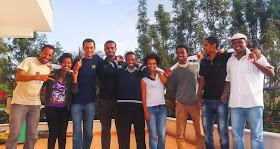"Such a restrictive media environment under controlled telecom service and high surveillance left freedom of expression—guaranteed by the country’s constitution and international agreements that Ethiopia signed—to crawl to death."
April 8th, 2015
Ethiopia’s 2005 election was the most contested ever and the government alleged journalists and editors were part of a conspiracy to overthrow the government. This left the free press, which was slowly expanding for the first time since the ruling party took power in 1991, under attack. The government started taking repressive measures against freedom of expression and association.
I joined the media sector during this time, when access to information was growing more restrictive. More than half of print publications were closed; journalists were getting harassed and prosecuted. Most websites with Ethiopian content operated by the diaspora population started getting blocked. The government also jammed satellite radio and television stations. Right after the 2005 election, the government also blocked text messaging on mobile phones, a state of affairs that continued until 2007.
 |
| Zone 9 Bloggers, six out of the nine are still in prsion since 2014 |
With a population of more than 90 million, Ethiopia is ranked as having one of the lowest Internet and mobile phone penetration rates in Africa. The government kept the Internet and mobile technologies under strict control in order to closely monitor the information accessed. Access to these services depends solely on the only state-owned telecommunication operator, Ethio Telecom.
It was when Ethiopia was suffocating under such narrow information access that social media became the new media platform worldwide. Within the available space, social media in the past few years has gained in popularity. In addition to helping Ethiopians contact and connect with long-lost acquaintances, friends, and next-of-kin relatives, social media allowed people to share information that had previously been confined to low circulation newspapers without any Internet presence. In particular, Facebook and Twitter gained popularity. Read more...See also Ethiopian Jailed Journalist on Global Journalist's report...
.jpg)
No comments:
Post a Comment